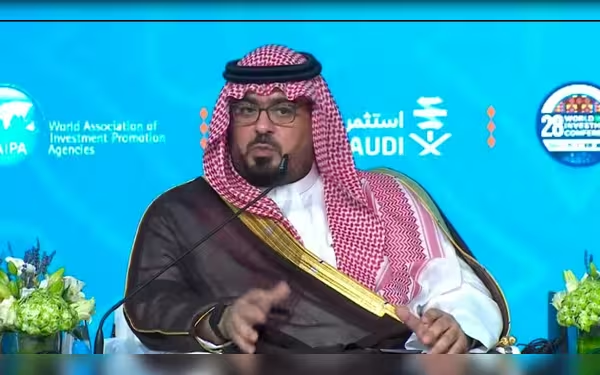Monday, December 23, 2024 05:34 PM
Saudi Arabia's Vision 2030 Drives Global Investment Growth
- Saudi Arabia aims for 150 million tourists by 2030.
- Non-oil activities now comprise 52% of GDP.
- Entertainment sector projected to create 450,000 jobs.
 Image Credits: arabnewspk
Image Credits: arabnewspkSaudi Arabia's Vision 2030 is transforming the economy, boosting tourism, and attracting global investments.
Saudi Arabia is making significant strides on the global investment stage, largely due to its ambitious Vision 2030 program. This initiative aims to diversify the Kingdom's economy, moving away from its traditional reliance on oil. A key focus of this program is the tourism sector, which has seen remarkable growth and is now a vital part of the non-oil economy.
At the recent World Investment Conference held in Riyadh, Faisal Al-Ibrahim, the Saudi Minister of Economy and Planning, emphasized the Kingdom's transformation into a "global growth platform" for investments. He noted that the National Tourism Strategy, which originally aimed to attract 100 million visitors annually by 2030, has already exceeded its target in 2023. This success has led to a new goal of welcoming 150 million visitors by the end of the decade. The contribution of tourism to the gross domestic product (GDP) is projected to increase from 6 percent to 10 percent, highlighting its growing importance in Saudi Arabia's economic landscape.
Al-Ibrahim attributed this progress to the Kingdom's deliberate efforts to diversify its economy. He stated, "Saudi Vision 2030 is producing results and returns. We are unlocking immense inherent potential everywhere we go." This statement reflects the Kingdom's commitment to fostering partnerships with both private and global entities, which has been crucial in driving economic growth.
Furthermore, the minister pointed out that non-oil activities now account for 52 percent of Saudi Arabia's real GDP. The fixed capital formation has also seen a significant rise, climbing to 25 percent of GDP from less than 12 percent before the implementation of Vision 2030. This shift indicates a robust investment environment that is attracting both local and international investors.
Al-Ibrahim also discussed Saudi Arabia's role in global cooperation, mentioning the Kingdom's invitation to join BRICS, a group of emerging economies. The decision is currently under review, with the final outcome expected soon. He highlighted the Kingdom's unique position in opening new sectors, such as entertainment, while simultaneously strengthening established industries like energy and healthcare.
In addition to tourism, the entertainment sector is projected to create 450,000 jobs and contribute 4.2 percent of GDP by 2030. The growth in this sector is closely linked to the increase in inbound tourism, which reached 6.2 million visitors in 2023, marking a 153.3 percent rise from the previous year.
During the same conference, Muhammad Sulaiman Al-Jasser, chairman of the Islamic Development Bank Group, emphasized the importance of basic infrastructure development for economic progress among member countries. He stated, "We listen very carefully to our members. We don’t tell them what they need to do. But we listen to them and agree on the activities and strategic projects." This approach underscores the need for strong policy frameworks to attract investors, as Al-Jasser noted that predictability and robustness in regulatory frameworks are crucial for investor confidence.
As Saudi Arabia continues to evolve, it is clear that the Kingdom is not just a player in the global investment arena but is positioning itself as a leader. The focus on diversification, innovation, and collaboration is paving the way for a sustainable economic future. With the ongoing developments in tourism and entertainment, along with the strengthening of existing industries, Saudi Arabia is set to become a beacon of growth and stability in the region.
The ambitious Vision 2030 program is not merely a plan; it is a transformative journey for Saudi Arabia. As the Kingdom embraces new opportunities and fosters global partnerships, it is poised to redefine its economic landscape and emerge as a key player in the global market. The future looks bright for Saudi Arabia, and the world is watching closely as it unfolds.













